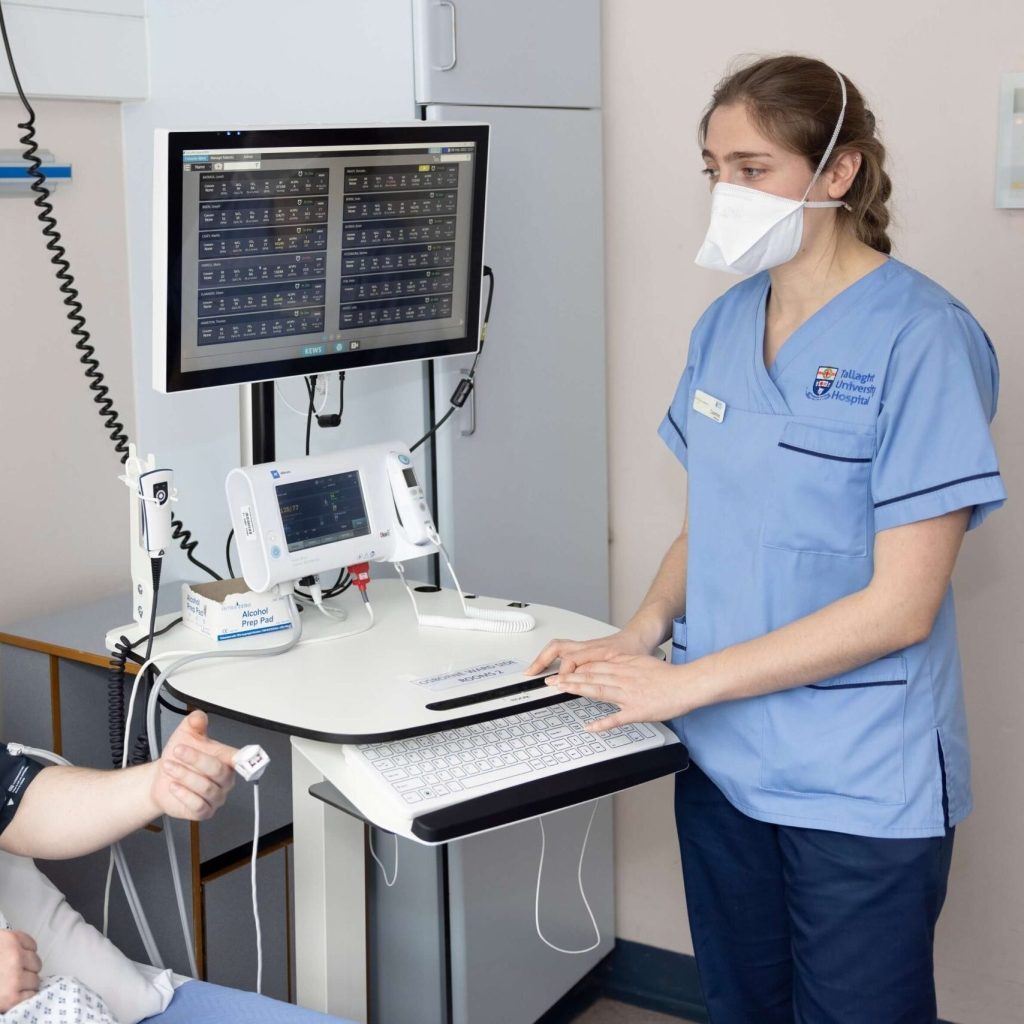
The healthcare industry is undergoing a digital transformation, and mobile computing is at the forefront of this revolution. With advancements in technology, healthcare professionals are leveraging mobile mountable computers to enhance patient care, streamline operations, and improve efficiency. These devices have also been called COWS (computers on wheels) and WOWs (workstations on wheels).
Let’s take a look into the significant role of mobile computing in healthcare, focusing on medical all-in-ones and medical cart computers, which are pivotal in driving this change.
The Rise of Mobile Computing in Healthcare
Mobile computing refers to the use of portable computing devices such as smartphones, tablets, and laptops to access and manage information. In healthcare, mobile computing is transforming the way medical services are delivered, enabling real-time access to patient data, enhancing communication among healthcare providers, and facilitating telemedicine.
The adoption of mobile computing in healthcare has been driven by several factors:
- Improved Patient Care: Mobile devices enable healthcare professionals to access patient records instantly, facilitating timely and informed decision-making.
- Increased Efficiency: Mobile computing streamlines administrative tasks, reducing paperwork and freeing up time for patient care.
- Enhanced Communication: Mobile devices support better communication between healthcare providers, ensuring a coordinated approach to patient care.
- Telemedicine: Mobile computing allows for remote consultations, expanding access to healthcare services, especially in underserved areas.
Medical All-in-Ones: The Future of Healthcare Workstations
Medical all-in-ones are integrated computing devices that combine a monitor and a computer into a single unit. Designed specifically for healthcare environments, these devices are equipped with features that cater to the unique needs of medical professionals. They are often used in patient rooms, nurses’ stations, and clinical laboratories.
Benefits of Medical All-in-Ones
- Space Efficiency: Medical all-in-ones save valuable space in healthcare settings, making them ideal for environments where space is limited.
- Enhanced Hygiene: These devices are designed with antimicrobial coatings and wipeable screens, and paired with sealed keyboards to reduce the risk of infection, crucial in healthcare environments.
- High Performance: Equipped with powerful processors and high-resolution displays, medical all-in-ones provide the performance needed for demanding healthcare applications.
- Ease of Use: With touch-screen capabilities and intuitive interfaces, medical all-in-ones are user-friendly, allowing healthcare professionals to operate them with minimal training.
- Durability: Built to withstand the rigors of healthcare settings, medical all-in-ones are robust and reliable, ensuring continuous operation.
Applications of Medical All-in-Ones in Healthcare
- Electronic Health Records (EHR): Medical all-in-ones are commonly used to access and update EHRs, providing healthcare professionals with immediate access to patient information.
- Medical Imaging: With high-resolution, large displays, medical all-in-ones are ideal for viewing and analyzing medical images, aiding in accurate diagnoses.
- Telemedicine: These devices facilitate telemedicine consultations, allowing healthcare providers to interact with patients remotely.
- Patient Monitoring: Medical all-in-ones can be integrated with monitoring systems to provide real-time data on patient vitals.
Medical Cart Computers: Mobility and Flexibility in Healthcare
Medical cart computers are mobile computing devices mounted on carts, allowing them to be easily moved within healthcare facilities. These devices are designed to provide healthcare professionals with on-the-go access to patient information, diagnostic tools, and communication systems.
Benefits of Medical Cart Computers
- Mobility: Medical cart computers can be wheeled to any location within a healthcare facility, providing flexibility and convenience for healthcare providers.
- Real-Time Access: These devices enable healthcare professionals to access patient records and medical information at the point of care, improving decision-making and patient outcomes.
- Versatility: Medical cart computers can be equipped with various peripherals, such as cameras, barcode scanners, and printers, to support a wide range of healthcare tasks.
- Battery Life: Equipped with long-lasting batteries, medical cart computers ensure uninterrupted operation throughout the day and can be operated 24/7 with hot-swappable batteries that do not require the device to be turned off while switching the battery and eliminate the need for large, costly cart batteries.
Applications of Medical Cart Computers in Healthcare
- Bedside Care: Medical cart computers are frequently used at the bedside to update patient records, administer medication, and monitor patient progress.
- Medication Administration: These devices support the administration of medication by providing real-time access to medication orders and patient information, reducing the risk of errors.
- Clinical Documentation: Medical cart computers facilitate the documentation of clinical notes and patient interactions, improving the accuracy and completeness of patient records.
- Patient Registration: In emergency departments and outpatient clinics, medical cart computers streamline the patient registration process, reducing wait times and improving the patient experience.
The Future of Mobile Computing in Healthcare
The future of mobile computing in healthcare looks promising, with advancements in technology continuing to drive innovation. Emerging trends such as artificial intelligence, machine learning, and the Internet of Things (IoT) are expected to further enhance the capabilities of mobile computing devices in healthcare.
- Artificial Intelligence (AI): AI-powered mobile devices will enable predictive analytics, personalized medicine, and advanced diagnostics, transforming patient care.
- Machine Learning: Machine learning algorithms will enhance the ability of mobile computing devices to analyze large datasets, providing valuable insights for healthcare providers.
- Internet of Things (IoT): IoT-enabled mobile devices will facilitate the integration of various medical devices and systems, enabling seamless data sharing and improved patient monitoring.
Mobile computing is revolutionizing healthcare, providing healthcare professionals with the tools they need to deliver better patient care, improve efficiency, and enhance communication. Medical all-in-ones and medical cart computers are at the forefront of this transformation, offering space-saving, mobile, and versatile solutions that cater to the unique needs of the healthcare industry. As technology continues to evolve, the role of mobile computing in healthcare will only grow, driving innovation and improving patient outcomes.

